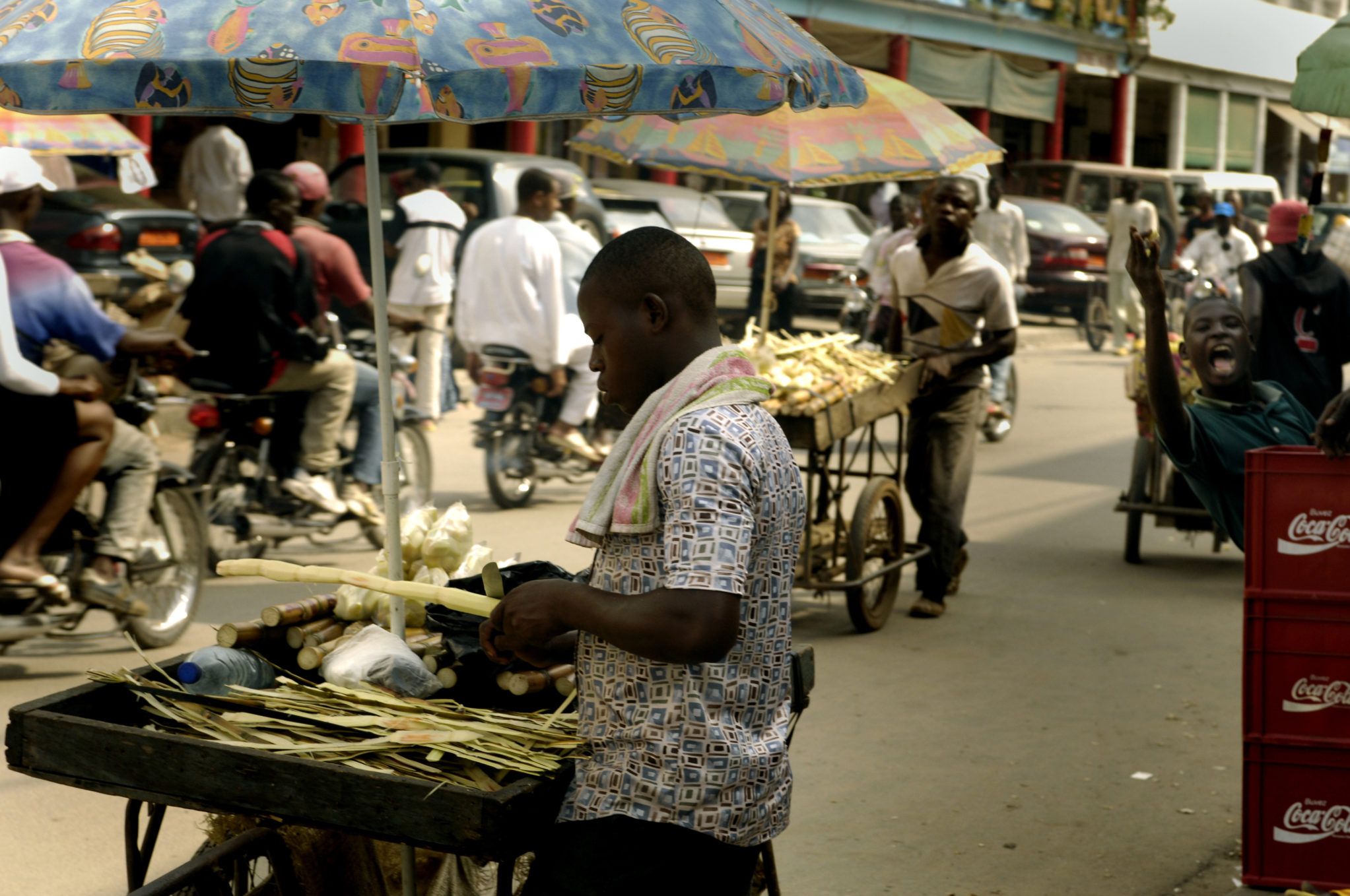
Thick black smoke billows from a pencil-thin chimney at the Port Harcourt Refining Company Limited, Rivers State, on September 16, 2015. AFP PHOTO/PIUS UTOMI EKPEI / AFP PHOTO / PIUS UTOMI EKPEI
Thick black smoke billows from a pencil-thin chimney at the Port Harcourt Refining Company Limited, Rivers State. AFP PHOTO/PIUS UTOMI EKPEI / AFP PHOTO / PIUS UTOMI EKPEI
As in Nigeria, there are concerns in Tanzania that elite accumulation strategies are determining the shape of local-content policies
Historically, striking oil has been both a blessing and a curse. On the Gulf of Guinea, post-independence governments lacked the technical know-how to extract and process petroleum. They were mere spectators as international oil companies established enclave economies staffed by expatriate workers and serviced by global corporations. The role of the state was limited to collecting revenues from royalties and taxes. Proceeds were vulnerable to fluctuations in output and global commodity prices.
Although governments established national oil companies during the 1970s and enacted requirements for joint ventures with local firms, indigenous participation in the extractive industries remained low. From the early 2000s onwards, African governments recognised the potential of the petroleum sector to promote economic transformation and job creation. Local-content policies were drafted, outlining measures designed to increase “the use or development by extractive sector operators of domestic labour, suppliers, goods and services, capital and infrastructure”, according to the February 2017 Natural Resource Governance Glossary.
Local-content policies were presented to international oil companies as an opportunity to develop shorter supply chains while bolstering the company’s “licence to operate” in affected communities. Qualitative requirements in local-content policies can resemble corporate social-responsibility initiatives such as an obligation to report on activity, share information and technology, or advertise contracting opportunities. Quantitative requirements can take the form of recruitment quotas/targets, training or promoting indigenous workers each year (often accompanied by succession plans for jobs held by expatriates), or quotas/targets for a minimum value of procurement of materials from domestic suppliers.
Opportunities abound: international oil companies need suppliers of security services, maintenance, cleaning, catering, IT and legal services, as well as construction materials such as concrete, paints, pipes, cables, pumps and valves. The Nigerian National Petroleum Corporation (NNPC) engaged in nearly a decade of consultation before legislating.
In 2010, the NNPC set minimum targets for local contracting and employment. It also established the Nigerian Content Development and Monitoring Board (NCDMB) to review international oil companies’ plans, evaluate their compliance, revise policies and guidelines, and build capacity in the sector.
Although estimates vary, Nigerian participation in engineering design and manufacturing has increased significantly, albeit from a low base, channelling billions of additional dollars into the local economy. Dr Ernest Nwapa, the pioneer executive secretary of the NCDMB, estimates that the number of Nigerians employed in the oil industry increased ten-fold between 2010 and 2015. But the push for indigenous employment and value addition has come at the expense of a focus on securing greater revenues from the sector through renegotiating agreements or imposing mandatory listings on the Nigerian Stock Exchange. Arguably, though, it has resulted in a greater benefit to the country as a whole by virtue of the capital retained in the local economy.
Many indigenous companies have scaled-up and formalised business practices to contract with the international oil companies. This is no small feat. Among other things, qualifying for a contract requires three years of audited accounts. International companies have high quality standards and expect tight turnaround times, and they can be slow to pay invoices.
Links between different sectors have been slow to emerge, however. While local-content policies have been relatively successful in promoting technology transfer and increasing national production of inputs, adding value to petroleum products remains a distant prospect. Aliko Dangote, Nigeria’s richest man, has repeatedly promised to build an oil refinery, but the project remains a pipedream.
As with indigenisation laws elsewhere on the continent, there is a risk that political elites might abuse local-content policies for personal profit. Requirements for joint ventures between international and local firms – in instances where a Nigerian company is unable to provide the necessary product or service – encourage “fronting”, whereby a well-connected citizen acts as a figurehead while foreigners remain in control of profits and operations. Monitoring should take account of a company’s contribution to the local manufacturing or services sector, examining its productivity and employment record, rather than fixating on whether or not it is 51% owned by a national.
Establishing a climate of trust and maintaining continuous dialogue are essential ingredients in such an assessment model. In instances where targets are not met, the NCDMB has opted to sit down with international oil companies and negotiate a way forward, rather than impose fines which might be written off as a cost of doing business.
Emerging Indian Ocean petroleum producers are now seeking to emulate the successes of established actors on the Gulf of Guinea such as Nigeria. In 2014, Tanzania published a draft local-content policy, characterised as possibly “the least rigorous in sub-Saharan Africa to date” by Jesse Ovadia, author of The Petro-Developmental State in Africa (2016) and an assistant professor at the University of Windsor, Canada.
Many international oil companies were taken aback when in July 2015 three laws governing the Tanzanian petroleum sector were introduced to the national assembly under a certificate of urgency. In May 2017, new regulations covering local content in the petroleum industry were put before parliament under the same procedure. The limited consultation and short period allowed for scrutinising complex legislation have raised concerns.
“The Tanzanian authorities believe they must codify strict requirements if they are to prevent outsiders from cheating the system, while international oil companies fear that government demands for local procurement are unrealistic and have been designed to benefit the politically connected,” Dr Abel Kinyondo, Director of Strategic Research at REPOA, a Tanzanian think tank, told Africa in Fact. Distrust in the petroleum sector has distracted from attempts to draw up workable local-content policies, he says.
The absence of a central body responsible for local-content monitoring and enforcement is an additional worry. Tanzania’s last president, Jakaya Kikwete, had sought to mandate the National Economic Empowerment Council to coordinate local content. His successor, John Magufuli, seems to be less interested in local-content policies and more in maximising revenue to the exchequer –judging by his recent confrontation with international mining companies.

Tanzanian President John Magufuli © GCIS
Acknowledging popular sentiment that Tanzania has not sufficiently benefited due to overly generous mining contracts, Magufuli has stoked up resource nationalism, promising to renegotiate terms and reassert sovereignty over minerals. But Magufuli’s grandstanding seems at odds with his promise to promote manufacturing in Tanzania, given the inputs needed by international mining companies.
State-owned enterprises (SOEs), a central pillar of industrial policy, have caught the president’s eye, albeit not for the reasons one might expect. “The shake-up of state-owned enterprises suggests that Magufuli is ready to use the daily operations of state-owned enterprises to consolidate power in anticipation of future rents,” Thabit Jacob, a Tanzanian doctoral researcher at Roskilde University, wrote in the journal African Affairs (April 2017).
In short, the tactic is a ploy to disrupt Kikwete’s power base, Jacob suggests. Magufuli’s intervention may, therefore, be more a question of maximising his political authority than of promoting Tanzania’s economic diversification.
As in Nigeria, there are concerns that elite accumulation strategies are determining the shape of local-content policies in Tanzania. Conglomerates linked to the ruling party, Chama Cha Mapinduzi, will benefit from joint ventures with foreign companies due to an absence of competition from mid-level firms, says Kinyondo. “International oil companies will struggle to find a Tanzanian partner,” he says. “Even when they do, a lack of competition is likely to lead to inflated prices and/or lower quality inputs.”
International oil companies may wish to turn a blind eye to elite capture in a context where the head of state has threatened changes to ownership and taxation regimes in the mining sector. But they are likely to struggle to comply with legal requirements as long as Tanzania lacks a single institution with the mandate and capacity to monitor, evaluate and enforce local-content policies. Having to engage with a number of regulators, often staffed by rent-seeking bureaucrats, amid a climate of distrust and an absence of transparency, is likely to present international oil companies with a choice between two unsatisfactory options: either solicit discretionary waivers, a process associated with corruption, or accept the threat of punitive costs for non-compliance, writing off fines as a cost of doing business in Tanzania. Experts in Lagos and Abuja may have raised the profile of local content in Africa, but officials in Dar es Salaam and Dodoma appear intent on redefining its meaning.
Nick Branson is an Associate Director in the Intelligence and Analysis team at Africa Practice, where he leads engagements on the energy transition. Nick has helped international investors in energy, mining and infrastructure projects navigate complex political, regulatory, and macroeconomic risks across the continent. He holds a MA in International Studies and Diplomacy and an MPhil in African Politics from SOAS, University of London. Nick speaks French, Spanish and Portuguese.













